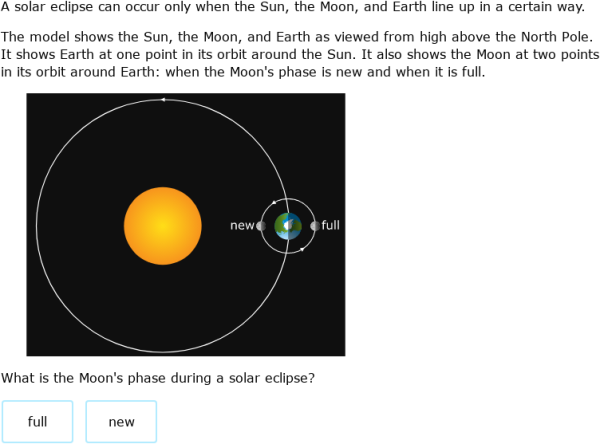FAQs
Answer: The answers are: A total lunar eclipse has a reddish color, The moon moves between Earth and the Sun during solar eclipse, and A lunar eclipse occurs during a full moon.
Which of the following statements is true concerning eclipses? ›
Final answer: The true statement about eclipses is that solar eclipses can only be observed from specific locations on Earth within the Moon's shadow. Lunar eclipses can be seen from anywhere on the night side of Earth and last longer than solar eclipses.
What is an eclipse answers? ›
Sometimes when the Moon orbits Earth, the Moon moves between the Sun and Earth. When this happens, the Moon blocks the light of the Sun from reaching Earth. This causes an eclipse of the Sun, or a solar eclipse. During a solar eclipse, the Moon casts a shadow onto Earth.
Which of the following statements is true about a total solar eclipse? ›
Out of the provided statements, the true statement about solar eclipses is: 'A total solar eclipse can be observed only from a certain region on the Earth. ' A solar eclipse occurs when the Moon comes in between the Sun and the Earth, and it blocks the light of the Sun from reaching certain regions of the Earth.
What is the true cause of eclipse? ›
A total solar eclipse happens when the Moon completely blocks the face of the Sun. It is the result of a cosmic coincidence. Even though the Sun is about 400 times bigger than the Moon, it is also about 400 times farther away. This makes the Sun and the Moon appear almost exactly the same size in our sky.
What is true about a solar eclipse? ›
A solar eclipse happens when the Moon passes between the Sun and Earth, casting a shadow on Earth that either fully or partially blocks the Sun's light in some areas. This only happens occasionally, because the Moon doesn't orbit in the exact same plane as the Sun and Earth do.
What are the 3 conditions for an eclipse? ›
For this to happen, the Earth must be physically between the Sun and Moon with all three bodies lying on the same plane of orbit. A lunar eclipse can only occur during a Full Moon and when the Moon passes through all or a portion of Earth's shadow.
Which of the following best describes an eclipse? ›
The correct answer is Position of the Moon between Sun & Earth on a new moon. A solar eclipse happens when the moon positioned between Earth and the sun, and the moon casts a shadow over Earth.
Are eclipses predictable True or false? ›
Eclipses occur in patterns. The Saros Series is a period of 223 lunar months that has been used to predict eclipses for thousands of years. In a Saros Series, exactly 9 years, 5.5 days after any lunar eclipse, a solar eclipse will occur, and vice versa.
What is an eclipse fact? ›
An eclipse is an awe-inspiring celestial event that drastically changes the appearance of the two biggest objects we see in our sky: our Sun and Moon. On Earth, people can experience solar and lunar eclipses when Earth, the Moon, and the Sun line up. Safety is the number one priority when viewing a solar eclipse.
Final answer: The statement that everyone on the daylight side of Earth can see a total solar eclipse is incorrect. A total solar eclipse is only visible from a specific path where the moon's shadow falls on Earth. Outside of this path, people will either see a partial solar eclipse or none at all.
What is an eclipse answer key in Quizlet? ›
What is an eclipse? An eclipse occurs any time something passes in front of the sun, blocking its light. This can be the earth or the moon. Lunar Eclipse. When the earth casts a shadow on the moon, causing the moon to go dark.
Is it true that all eclipses are total? ›
Solar eclipses may be classified as either total, in which the Moon completely covers the Sun, or annular, in which the Moon obscures all but an outer ring of the Sun. Whether an eclipse is total or annular depends on the distance between these three objects.
Which of the following statements defines the solar eclipse? ›
A solar eclipse occurs when the moon gets between Earth and the Sun, and the moon casts a shadow over Earth.
What happens during an eclipse? ›
A total solar eclipse happens when the Moon passes between the Sun and Earth, completely blocking the face of the Sun.
Did you know facts about eclipse? ›
Partial solar eclipses can be seen up to 3,000 miles from the "track" of totality. The maximum number of solar eclipses (partial, annular, or total) is 5 per year, and there are at least 2 solar eclipses per year somewhere on the Earth. Everyone in the continental U.S. will see at least a partial eclipse.
What are the true facts about lunar eclipse? ›
A lunar eclipse occurs when the Sun, Earth, and Moon align so that the Moon passes into Earth's shadow. In a total lunar eclipse, the entire Moon falls within the darkest part of Earth's shadow, called the umbra. When the Moon is within the umbra, it will turn a reddish hue.
Which statement is true of all lunar eclipses? ›
Expert-Verified Answer
A true statement about lunar eclipses is that c A lunar eclipse occurs when Earth is between the Sun and the Moon.


